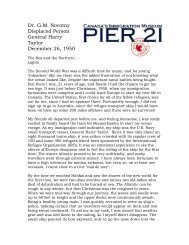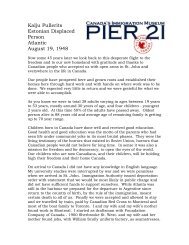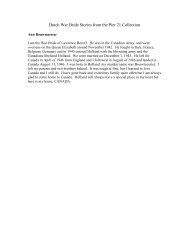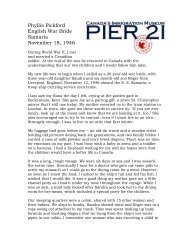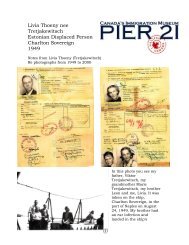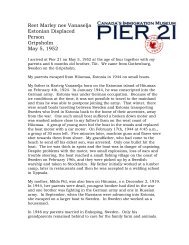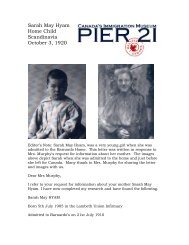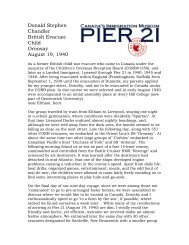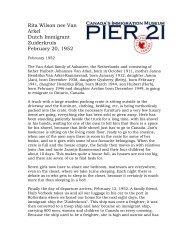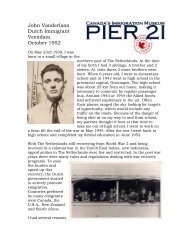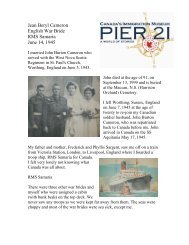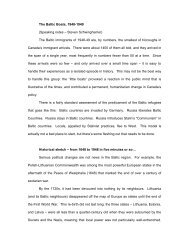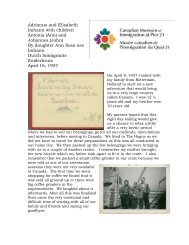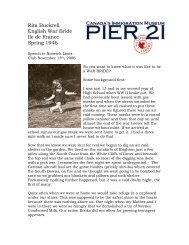Dutch and German Immigrants The Prins Family - Pier 21
Dutch and German Immigrants The Prins Family - Pier 21
Dutch and German Immigrants The Prins Family - Pier 21
You also want an ePaper? Increase the reach of your titles
YUMPU automatically turns print PDFs into web optimized ePapers that Google loves.
As the war progressed, provisions became scarcer <strong>and</strong> I made more tripsto the farm in Aalsmeer to supplement our shrinking supplies. I camehome with wheat, milk, cheese etc. Aunt Aal made a remark about thisafter the war which I still remember. She said: "We always have hadfamily visiting us (before the war), but during the war the family tripledin size!"During the final year of the war (we didn’t know that at the time ofcourse) everything deteriorated in a hurry. We knew the invasion wasimminent but in the newspapers we were still reading that <strong>German</strong>y waswinning upon all fronts. In the third week of September 1944 we saw theglider fleet from Engl<strong>and</strong> fly over l<strong>and</strong> to l<strong>and</strong> near Arnhem. We figuredthe war for us would be over in no time, but it was not to be.It must have been October or November that year when we had to moveagain; this time to the Kennemerlaan 142. <strong>The</strong> <strong>German</strong>s had their gunspositioned on the Moerberg, the highest dune at the south side of thetown. To have an unobstructed view on the canal locks <strong>and</strong> the railwaybridge across the canal they moved in the wrecking crews <strong>and</strong> tore downall the houses in their way, including the house we lived in. In a way,this was not that disastrous for us for we had lots of doors, windowframes <strong>and</strong> beams to burn to keep us warm <strong>and</strong> to cook the food. And Istill have my mangled thumbnail to show for it.<strong>The</strong>re were, beside the army, the sea forces (Kriegsmarine) stationed inIJmuiden. <strong>The</strong>re main force consisted out of torpedo boats <strong>and</strong> I haveseen some one or two man U-boats in the harbour. Of the later ones, Idon’t know if they ever employed them; they looked more like suicideboats to me.During the last year of the war, as mentioned before, provisions werebecoming very scarce. Bread was baked at home from wheat obtainedfrom the farm. This wheat was milled at home in a h<strong>and</strong>-cranked coffeegrinder.To increase the volume squashed tulip bulbs were added to thedough. It gave the bread a sweet taste, but at least it was edible. Syrupwas made by boiling a mixture of shredded sugar beets <strong>and</strong> water, thanseparating the pulp from the liquid.<strong>The</strong>re was no school during those last months. <strong>The</strong> railway workers wereon strike <strong>and</strong> all essential services ground to a halt. Electricity <strong>and</strong> gaswere cut off <strong>and</strong> we had only the bare minimum of food. Once a month Iwent to the farm <strong>and</strong> they helped us through that 'hunger' winter. I alsowent with Aunt Lena on the bike to the eastern part of Holl<strong>and</strong> (Overysel<strong>and</strong> Drente) to buy food, mainly rye. My bike had one 'good ' tire <strong>and</strong> onenon-inflatable <strong>and</strong> the trip took us six days. You always had to watchout for checkpoints on the road; they would confiscate your stuff if you



